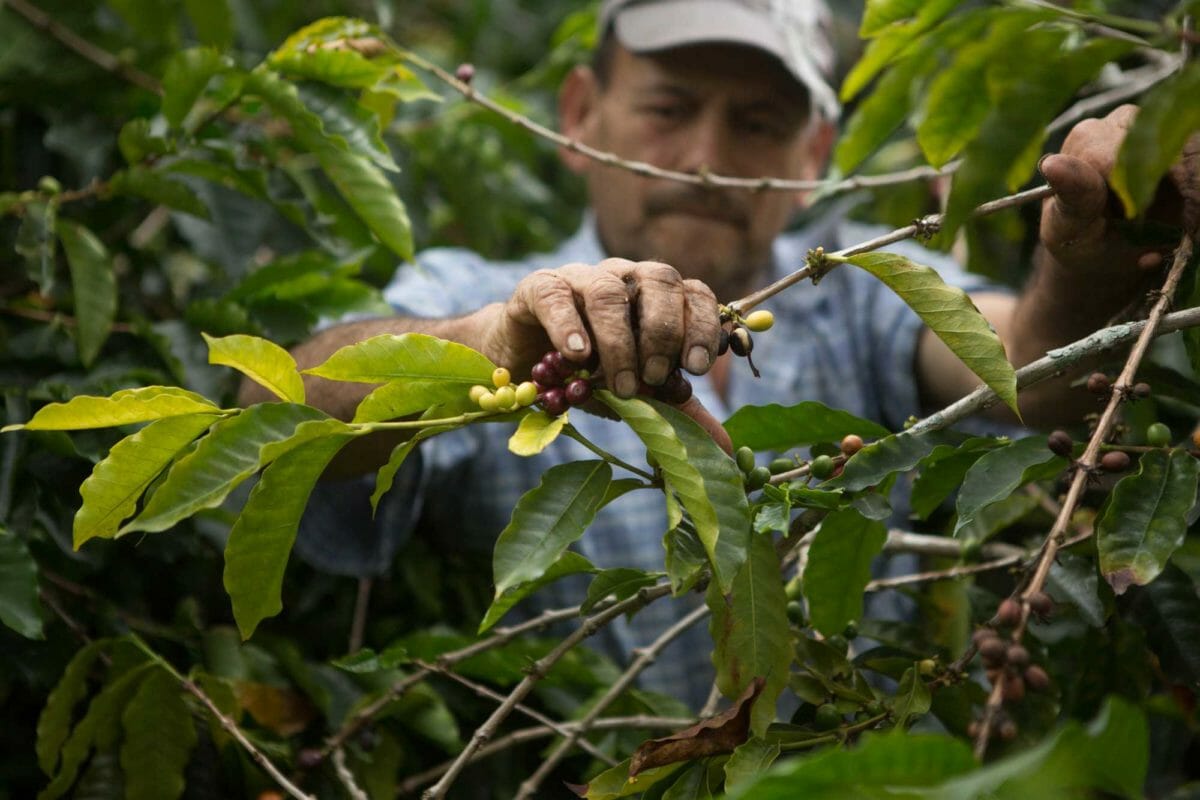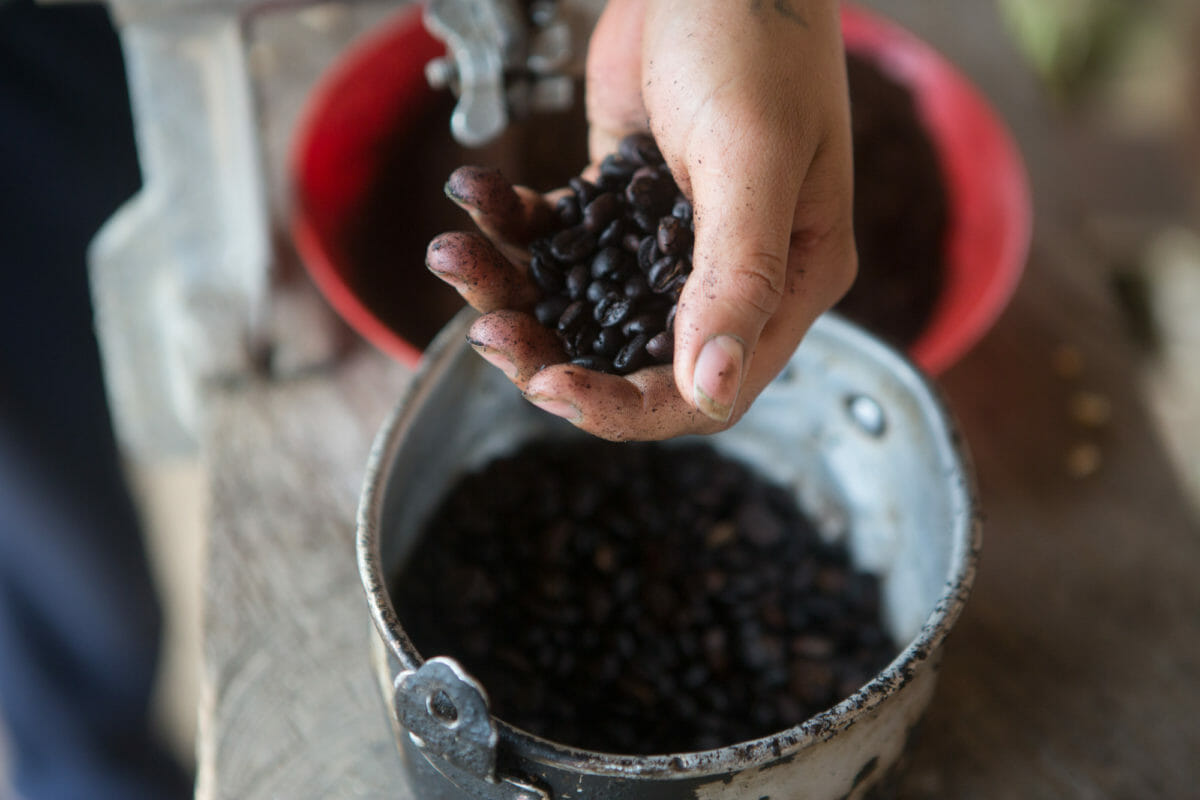COVID-19 Causes Supply Chain Headaches for Coffee Growers
Demand shortages have put pressure on farmers in coffee-producing countries.
COVID-19 Causes Supply Chain Headaches for Coffee Growers
Demand shortages have put pressure on farmers in coffee-producing countries.

Disruptions will create extra costs that eventually will fall either on consumers or coffee farmers.courtesy of Devoción
Are you missing your daily trip to the coffee shop? So are roasters and coffee farmers.
The closure of cafés across America has led to growing uncertainty for growers and small roasters within the $18-billion-a-year industry.
Coffee culture is inextricably tied to the Latin American producers who grow much of the beans imported to America. These coffee farmers have been battling the environmental impacts of climate change and coffee rust for years, but now COVID-19 is disrupting supply chains and endangering the American coffee imports they rely on.
Large coffee houses—like Maxwell House and Folgers—have been stockpiling beans in fear of shortages and price increases. Commodity coffee companies can weather small rises in production costs or a short lack of demand. But for small specialty coffee importers and roasters, the lack of demand might not only sink their businesses but irreversibly impact the communities that grow high-end beans.
For now, the actual production hasn’t been impacted as much as the mechanisms of exportation. Commodity coffee is trading at a little over one dollar a pound, down from its 52-week high of around $1.30 in December.
Any extra production costs on commodity coffee will be felt by consumers as a small increase in price on store shelves, says Miguel Gomez, an associate professor of applied economics at Cornell University. It will be the smaller roasters, who directly source from predominantly family-run coffee farms, that will suffer, he says.
“I am uncertain on the ability of these specialty coffee roasters to be able to pay the prices that they have been for coffee because the demand is not there,” says Gomez.

The demand shortages caused by restaurant and café closures have put pressure downstream on the communities and cooperatives in Guatemala, Colombia, and other coffee-producing countries. This lack of demand has been compounded by extra production costs seen throughout global supply chains.
“There’s an imbalance of equipment in the global shipping system that started with the China trade war,” says Todd Caspersen, the vice president of coffee cooperative Equal Exchange. “There’s just less containers and they’re in the wrong places.”
Ocean freight prices have gone up because shipping containers have had trouble getting to ports where coffee is exported. Labor disruptions in India where many coffee bags are made, could affect pricing further down the chain as coffee farmers struggle to get all the export materials they need, says Caspersen.
That’s not even taking into account labor shortages in coffee-growing countries, the cost of increased sanitation in processing beans, and the impacts of more substantial outbreaks in coffee-producing regions.
All of these costs eventually will fall either on the consumer or the producer.
While COVID-19 will likely continue to destabilize the region, Colombia is trying to weather the storm as the country’s farmers head into their arabica bean harvest. Temporary labor is usually relied on to help manually harvest beans; yet, concern of the novel coronavirus spreading in rural areas has restricted the amount of labor available for harvest. In turn, Colombian coffee production was down 28 percent last month compared to April 2019.
The Colombian Coffee Growers Federation has been a strong “safety net” for producers in the past helping to maintain higher prices for farmers’ beans, says Gomez. The challenges COVID-19 is posing to harvesting, production, and exportation might be moderately offset by protections that the federation is putting in place to help farmers.
The country’s coffee producers have overcome many socio-political challenges over the years, and for them, the pandemic is just the latest threat to their livelihoods.
Correction: A previous version of this story said Todd Caspersen was the president of coffee cooperative Equal Exchange. Caspersen is in fact the vice president. We apologize for the error.
Follow us
This work is licensed under a Creative Commons Attribution-NoDerivatives 4.0 International License.
Want to republish a Modern Farmer story?
We are happy for Modern Farmer stories to be shared, and encourage you to republish our articles for your audience. When doing so, we ask that you follow these guidelines:
Please credit us and our writers
For the author byline, please use “Author Name, Modern Farmer.” At the top of our stories, if on the web, please include this text and link: “This story was originally published by Modern Farmer.”
Please make sure to include a link back to either our home page or the article URL.
At the bottom of the story, please include the following text:
“Modern Farmer is a nonprofit initiative dedicated to raising awareness and catalyzing action at the intersection of food, agriculture, and society. Read more at <link>Modern Farmer</link>.”
Use our widget
We’d like to be able to track our stories, so we ask that if you republish our content, you do so using our widget (located on the left hand side of the article). The HTML code has a built-in tracker that tells us the data and domain where the story was published, as well as view counts.
Check the image requirements
It’s your responsibility to confirm you're licensed to republish images in our articles. Some images, such as those from commercial providers, don't allow their images to be republished without permission or payment. Copyright terms are generally listed in the image caption and attribution. You are welcome to omit our images or substitute with your own. Charts and interactive graphics follow the same rules.
Don’t change too much. Or, ask us first.
Articles must be republished in their entirety. It’s okay to change references to time (“today” to “yesterday”) or location (“Iowa City, IA” to “here”). But please keep everything else the same.
If you feel strongly that a more material edit needs to be made, get in touch with us at [email protected]. We’re happy to discuss it with the original author, but we must have prior approval for changes before publication.
Special cases
Extracts. You may run the first few lines or paragraphs of the article and then say: “Read the full article at Modern Farmer” with a link back to the original article.
Quotes. You may quote authors provided you include a link back to the article URL.
Translations. These require writer approval. To inquire about translation of a Modern Farmer article, contact us at [email protected]
Signed consent / copyright release forms. These are not required, provided you are following these guidelines.
Print. Articles can be republished in print under these same rules, with the exception that you do not need to include the links.
Tag us
When sharing the story on social media, please tag us using the following: - Twitter (@ModFarm) - Facebook (@ModernFarmerMedia) - Instagram (@modfarm)
Use our content respectfully
Modern Farmer is a nonprofit and as such we share our content for free and in good faith in order to reach new audiences. Respectfully,
No selling ads against our stories. It’s okay to put our stories on pages with ads.
Don’t republish our material wholesale, or automatically; you need to select stories to be republished individually.
You have no rights to sell, license, syndicate, or otherwise represent yourself as the authorized owner of our material to any third parties. This means that you cannot actively publish or submit our work for syndication to third party platforms or apps like Apple News or Google News. We understand that publishers cannot fully control when certain third parties automatically summarize or crawl content from publishers’ own sites.
Keep in touch
We want to hear from you if you love Modern Farmer content, have a collaboration idea, or anything else to share. As a nonprofit outlet, we work in service of our community and are always open to comments, feedback, and ideas. Contact us at [email protected].by Lukas Southard, Modern Farmer
May 23, 2020
Modern Farmer Weekly
Solutions Hub
Innovations, ideas and inspiration. Actionable solutions for a resilient food system.
ExploreExplore other topics
Share With Us
We want to hear from Modern Farmer readers who have thoughtful commentary, actionable solutions, or helpful ideas to share.
SubmitNecessary cookies are absolutely essential for the website to function properly. This category only includes cookies that ensures basic functionalities and security features of the website. These cookies do not store any personal information.
Any cookies that may not be particularly necessary for the website to function and are used specifically to collect user personal data via analytics, ads, other embedded contents are termed as non-necessary cookies.
Has anyone tried chicory? I think it is the root that provides a strong drink??